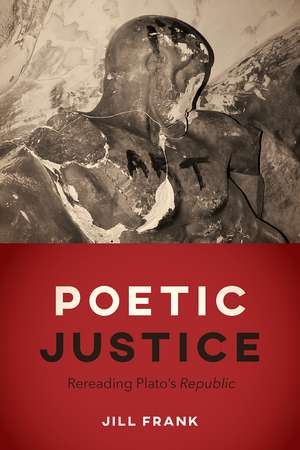Poetic Justice: Rereading Plato's "Republic"
Autor Jill Franken Limba Engleză Paperback – 22 feb 2018
When Plato set his dialogs, written texts were disseminated primarily by performance and recitation. He wrote them, however, when literacy was expanding. Jill Frank argues that there are unique insights to be gained from appreciating Plato’s dialogs as written texts to be read and reread. At the center of these insights are two distinct ways of learning to read in the dialogs. One approach that appears in the Statesman, Sophist, and Protagoras, treats learning to read as a top-down affair, in which authoritative teachers lead students to true beliefs. Another, recommended by Socrates, encourages trial and error and the formation of beliefs based on students’ own fallible experiences. In all of these dialogs, learning to read is likened to coming to know or understand something. Given Plato’s repeated presentation of the analogy between reading and coming to know, what can these two approaches tell us about his dialogs’ representations of philosophy and politics?
With Poetic Justice, Jill Frank overturns the conventional view that the Republic endorses a hierarchical ascent to knowledge and the authoritarian politics associated with that philosophy. When learning to read is understood as the passive absorption of a teacher’s beliefs, this reflects the account of Platonic philosophy as authoritative knowledge wielded by philosopher kings who ruled the ideal city. When we learn to read by way of the method Socrates introduces in the Republic, Frank argues, we are offered an education in ethical and political self-governance, one that prompts citizens to challenge all claims to authority, including those of philosophy.
With Poetic Justice, Jill Frank overturns the conventional view that the Republic endorses a hierarchical ascent to knowledge and the authoritarian politics associated with that philosophy. When learning to read is understood as the passive absorption of a teacher’s beliefs, this reflects the account of Platonic philosophy as authoritative knowledge wielded by philosopher kings who ruled the ideal city. When we learn to read by way of the method Socrates introduces in the Republic, Frank argues, we are offered an education in ethical and political self-governance, one that prompts citizens to challenge all claims to authority, including those of philosophy.
Preț: 240.69 lei
Nou
Puncte Express: 361
Preț estimativ în valută:
46.06€ • 47.58$ • 38.34£
46.06€ • 47.58$ • 38.34£
Carte tipărită la comandă
Livrare economică 25 martie-08 aprilie
Preluare comenzi: 021 569.72.76
Specificații
ISBN-13: 9780226515779
ISBN-10: 022651577X
Pagini: 288
Dimensiuni: 152 x 229 x 18 mm
Greutate: 0.39 kg
Ediția:1
Editura: University of Chicago Press
Colecția University of Chicago Press
ISBN-10: 022651577X
Pagini: 288
Dimensiuni: 152 x 229 x 18 mm
Greutate: 0.39 kg
Ediția:1
Editura: University of Chicago Press
Colecția University of Chicago Press
Notă biografică
Jill Frank is professor in the Department of Government at Cornell University and the author of A Democracy of Distinction.
Cuprins
Acknowledgments
Prologue Learning to Read
1 Reading Plato
2 Poetry: The Measure of Truth
3 A Life without Poetry
4 The Power of Persuasion
5 Erōs: The Work of Desire
6 Dialectics: Making Sense of Logos
Epilogue Poetic Justice
Works Cited
Index
Prologue Learning to Read
1 Reading Plato
2 Poetry: The Measure of Truth
3 A Life without Poetry
4 The Power of Persuasion
5 Erōs: The Work of Desire
6 Dialectics: Making Sense of Logos
Epilogue Poetic Justice
Works Cited
Index
Recenzii
"Jill Frank’s Poetic Justice makes an important contribution to the ongoing conversation about the contemporary relevance of Plato’s political philosophy. Philosophers, political theorists, and classicists will find much to grapple with in Frank’s re-assessment of how the Republic aims at cultivating philosophically-engaged and self-reflective citizens. . . . Poetic Justice exemplifies the work of political philosophy. Philosophy and the responsibility of reflective citizenship come together in new and exciting ways."
